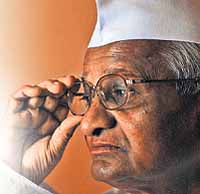
LOKPAL BILL
 The
word Lokpal means an ombudsman in India. The word has been derived from the
Sanskrit words "loka" (people) and "pala" (protector/caretaker). So the word
Lokpal means 'protector of people'. The concept of Lokpal has been drawn up to
root out corruption at all levels in the prevailing Indian polity.
The
word Lokpal means an ombudsman in India. The word has been derived from the
Sanskrit words "loka" (people) and "pala" (protector/caretaker). So the word
Lokpal means 'protector of people'. The concept of Lokpal has been drawn up to
root out corruption at all levels in the prevailing Indian polity.
The Lokpal will be a three-member body with a chairperson who
is or was a chief justice or Supreme Court judge, and two members who are or
have been high courts judges or chief justices.Implementation of the Lokpal bill
will hopefully reduce corruption in India. The basic idea of the Lok Pal is
borrowed from the office of ombudsman, which has played an effective role in
checking corruption and wrong-doing in Scandinavian and other nations. In early
1960s, mounting corruption in public administration set the winds blowing in
favour of an Ombudsman in India too.
The Administrative Reforms Commission (ARC) set up in 1966
recommended the constitution of a two-tier machinery - of a Lokpal at the
Centre, and Lokayukta(s) in the states.the Lokpal has to complete the inquiry
within six months.
Duties of Lokpal are as follows:
1. To judge the cases and make jurisdictions against corruption cases with
the Lokpal.
2. To judge whether a case is legal or whether a fake complaint has been made.
3. To potentially impose fines on a fake complaint, or even a short span of jail
time, if the case is not proved to be legally true.
In India, the Jan Lokpal Bill (also referred to as the
citizens' ombudsman bill) is a proposed anti-corruption law designed to
effectively deter corruption, redress grievances and protect whistleblowers. The
law would create an ombudsman called the Lokpal; this would be an independent
body similar to the Election Commission of India with the power to prosecute
politicians and bureaucrats without prior government permission.
A compromise bill, merging the Government's version and that
of the civil group's version (Jan Lokpal), is being drafted by a committee of
five Cabinet Ministers and five social activists. As of July 2011, the most
current version of the bill is version 2.3, according to the government website.
For 42 years, the government-drafted bill has failed to pass the Rajya Sabha,
the upper house of the Parliament of India.The first Lokpal Bill was passed in
the 4th Lok Sabha, the lower house of the Parliament, in 1969 but stalled in the
Rajya Sabha. Subsequent Lokpal bills were introduced in 1971, 1977, 1985, 1989,
1996, 1998, 2001, 2005 and 2008 but all failed to pass.
Latest Developments
Anna Hazare, a Gandhian rights activist, had started a fast
unto death at Jantar Mantar in New Delhi demanding the passing of the bill.
Hazare called off his hunger strike on the 9th of April, 2011 bringing to an end
his 98-hour protest after the government issued a gazette notification
constituting a 10-member Joint Committee of government ministers and civil
society activists, including him, to draft a bill for the creation of an
effective Lokpal.